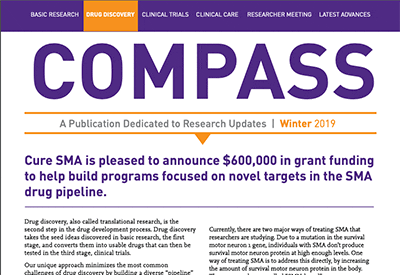To celebrate the FDA approval of Spinraza, Cure SMA contributed an article to the September special issue of the journal Gene Therapy. The issue , “Spinraza and Advanced Therapies: a stakeholder special,” covers a variety of perspectives and includes comments and review papers from SMA research funders, people affected by SMA, experts in the advanced therapies field, SMA scientists and clinicians, regulators, ethics, pricing, intellectual property experts, and community stakeholders.
Cure SMA’s article, “Cure SMA and our patient community celebrate the first approved drug for SMA,” features Cure SMA’s early contributions to the pre-clinical development of Spinraza and highlights the meaningfulness of an approved therapy to our community. In the article, we celebrate how far we’ve come and the decades of hard work and perseverance by families, researchers, companies, and the FDA to reach this approval.
We also look ahead, with hope that Spinraza will be the leading edge of a robust drug pipeline with optimal therapies for every age and stage of SMA. Cure SMA remains committed to the continued development of new therapies and to optimization of delivery of those therapies, including timing of delivery ensuring our community has access to those therapies for maximum effect. To that end, this includes projects in drug access, insurance coverage, and standards of care. Cure SMA is also working to advocate for SMA newborn screening on both the federal and state level.
Also featured in the special issue is the Food and Drug administration (FDA) perspective on lessons learned from the Spinraza approval. The article, “Development of gene therapies-lessons from nusinersen” was authored by Billy Dunn, Wilson Bryan, and colleagues. Drs. Dunn and Bryan was were a speakers at Cure SMA’s recently held patient Patient Focused Drug Development Meeting with the FDA . The article highlights important lessons regarding the pathway to marketing approval for gene therapies. These lessons emphasize rigorous clinical trial design, flexibility in trial design and analysis, a collaborative effort with regular communications between the drug developer and the FDA, and use of FDA’s expedited programs. These lessons are critical to the development of gene therapies for the treatment of SMA as well as other rare diseases.



